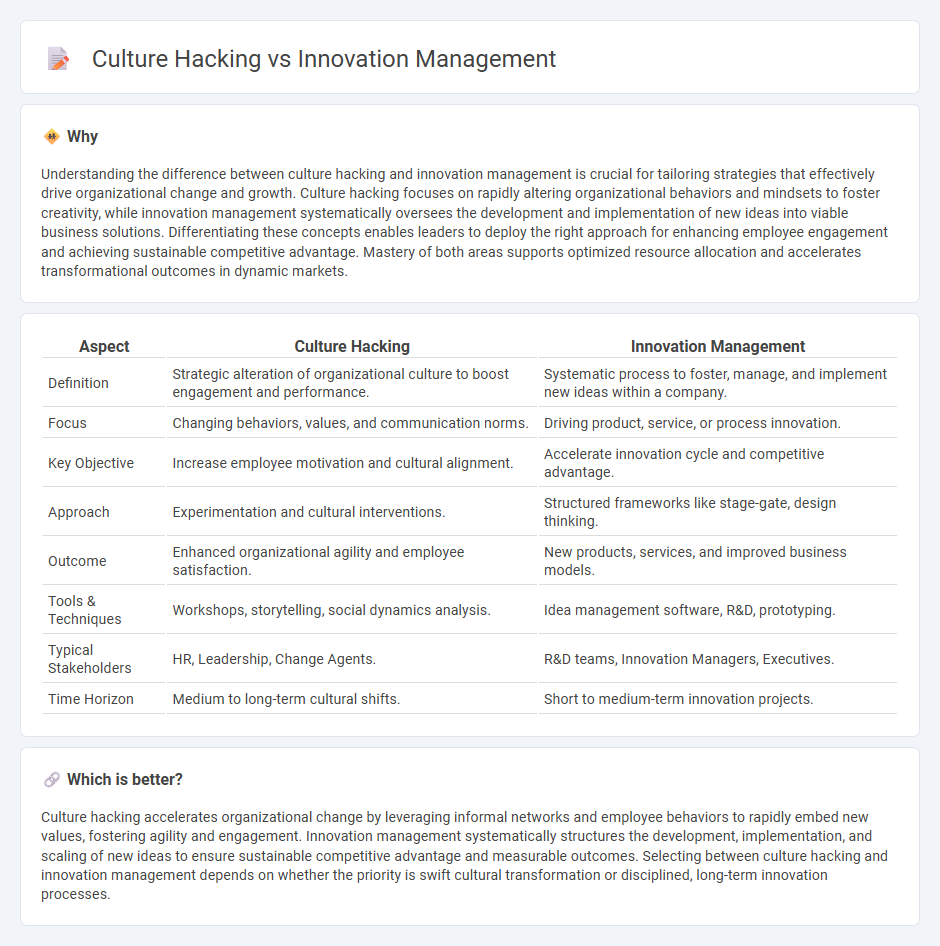
Culture hacking focuses on rapidly transforming organizational culture through unconventional methods and employee engagement techniques, while innovation management systematically drives the development and implementation of new ideas using structured processes and tools. Both strategies aim to enhance business performance, yet culture hacking emphasizes agility and grassroots change, contrasting with the strategic, project-based approach of innovation management. Explore how integrating culture hacking and innovation management can unlock your organization's full creative potential.
Why it is important
Understanding the difference between culture hacking and innovation management is crucial for tailoring strategies that effectively drive organizational change and growth. Culture hacking focuses on rapidly altering organizational behaviors and mindsets to foster creativity, while innovation management systematically oversees the development and implementation of new ideas into viable business solutions. Differentiating these concepts enables leaders to deploy the right approach for enhancing employee engagement and achieving sustainable competitive advantage. Mastery of both areas supports optimized resource allocation and accelerates transformational outcomes in dynamic markets.
Comparison Table
| Aspect | Culture Hacking | Innovation Management |
|---|---|---|
| Definition | Strategic alteration of organizational culture to boost engagement and performance. | Systematic process to foster, manage, and implement new ideas within a company. |
| Focus | Changing behaviors, values, and communication norms. | Driving product, service, or process innovation. |
| Key Objective | Increase employee motivation and cultural alignment. | Accelerate innovation cycle and competitive advantage. |
| Approach | Experimentation and cultural interventions. | Structured frameworks like stage-gate, design thinking. |
| Outcome | Enhanced organizational agility and employee satisfaction. | New products, services, and improved business models. |
| Tools & Techniques | Workshops, storytelling, social dynamics analysis. | Idea management software, R&D, prototyping. |
| Typical Stakeholders | HR, Leadership, Change Agents. | R&D teams, Innovation Managers, Executives. |
| Time Horizon | Medium to long-term cultural shifts. | Short to medium-term innovation projects. |
Which is better?
Culture hacking accelerates organizational change by leveraging informal networks and employee behaviors to rapidly embed new values, fostering agility and engagement. Innovation management systematically structures the development, implementation, and scaling of new ideas to ensure sustainable competitive advantage and measurable outcomes. Selecting between culture hacking and innovation management depends on whether the priority is swift cultural transformation or disciplined, long-term innovation processes.
Connection
Culture hacking leverages organizational behavior insights to accelerate innovation by breaking down traditional mindsets and fostering creative collaboration. Innovation management systematically applies these cultural shifts to optimize idea generation, development, and implementation processes within companies. Integrating culture hacking into innovation management enhances adaptability and drives sustained competitive advantage through continuous transformation.
Key Terms
Disruptive Innovation
Disruptive innovation thrives when organizations effectively integrate innovation management with culture hacking, fostering an environment where creative ideas rapidly evolve into market-changing solutions. Innovation management provides structured methodologies for identifying and scaling breakthrough technologies, while culture hacking reshapes organizational behaviors to embrace risk-taking and continuous learning. Discover how combining these approaches can accelerate disruptive innovation and transform your business landscape.
Organizational Agility
Innovation management drives organizational agility by systematically implementing processes that foster creativity, streamline idea generation, and accelerate product development cycles. Culture hacking enhances agility through strategic interventions that reshape employee mindsets, promote adaptive behaviors, and break down silos within company structures. Discover how integrating these approaches can transform your organization's responsiveness and market competitiveness.
Change Agents
Innovation management emphasizes structured processes and strategic frameworks to foster continuous improvement and competitive advantage, while culture hacking targets informal, grassroots methods to shift organizational mindset and behavior rapidly. Change agents play a pivotal role by bridging formal innovation initiatives and cultural dynamics to accelerate adoption and sustain transformation. Explore effective strategies to empower change agents and maximize impact in your organization.
Source and External Links
What is Innovation Management? Definition, Process and Best Practices - Innovation management is the systematic and strategic process of generating, developing, and implementing new ideas to help organizations stay competitive by fostering a culture of innovation, embracing emerging technologies, building partnerships, and encouraging cross-functional collaboration.
What is innovation management? | Definition from TechTarget - Innovation management is the discipline of managing an organization's innovation process from ideation through implementation to drive sustainable innovation, business growth, and competitive advantage by creating new products, services, and business models.
Innovation management - Wikipedia - Innovation management combines managing innovation processes and change management across product, process, marketing, and organizational innovation, using tools like brainstorming, prototyping, and portfolio management to accelerate time-to-market and continuously develop organizations.
 dowidth.com
dowidth.com